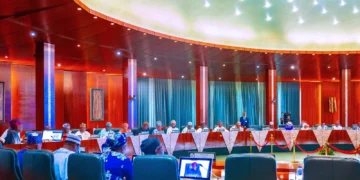Do you drive blind? Or are you a blind driver? This poser was my focus last week. I wish to draw the curtain on this piece, hoping that I have succeeded in stirring the consciousness of some drivers, who, like me, profess one faith or the other. I am not asking these rhetorical questions in the traditional sense.
Like I said last week, I am not asking if you are blind or you have any impairment. Neither am I not talking of the other two concepts of blind driving which includes driving with a blindfold as a team building experience. Or the second which is the possibility of driving with a visual impairment, or even blindness, with adapted vehicle and training please. I am talking of driving disconnected from our religious beliefs and faith.
In the opening piece, I shared the thoughts of many writers who eulogise the Christian and the Muslim faith. These writers I also mentioned, identify the influence of both faith in moulding different facets of society, fostering social cohesiveness, and a strong sense of community. Both faiths agree that they inspire the faithful to help one another and practice charity.
The dominance of both faiths, I believe, should translate to a vast generation of pious drivers whose driving reflects religious values. These drivers should often emphasise respecting others and following safety regulations. Their virtues should include being polite, patient, and avoiding road rage.
Despite these attributes, I sometimes drive in awe when I encounter drivers who profess these faiths. They drive blind as their faith does not reflect in their driving. There is a huge disconnect between their faith and safe driving practices, which explains why the places of worship rank high in the Corps’ target centre for advocacy and enlightenment.
For the record, the Christian faith in Romans 13:1-7 admonishes believers to obey all authority in the land. My Muslim teacher and friend finally provided an equivalent provision in the Holy Koran, which I am confident does the same. My Muslim teacher told me that the Holy Quran, chapter 4:59, says, “O ye who have believed, obey Allah and obey His Messenger and the people of authority amongst you. And if you disagree over anything, return the matter to Allah and His Messenger (Muhammad, pbuh? If you truly believe in Allah and the Last Day”.
Both faiths preach obedience to constituted authority, such as the Federal Road Safety Corps (FRSC), and, by extension, the provisions of the National Road Traffic Regulations. The regulations contain rules prohibiting driving against traffic, not buckling up, excessive speed, running traffic lights, using a phone while driving, overloading, and underage driving, among other traffic infractions.
Yet the level of traffic infractions amazes even on Sundays and Fridays, which are worship days for both faiths, rather than displaying piety in driving. During festivities such as Sallah, Christmas, and Easter, there are heightened driving infractions.
For years, I have daily pondered the question of Nigerian drivers’ religious beliefs, irrespective of their religious inclinations. During my career, as stated earlier, I was privileged to hold positions in Kaduna, Port Harcourt, the Rivers State capital, Imo State, Lagos, Plateau, the Federal Capital Territory (FCT), and Enugu. I was privileged to interact with all tribes, religions, classes, and genders.
My deployment to Lagos, FCT, Abuja, Kaduna, Plateau, Owerri and Port Harcourt some years ago further provoked this burning thought, which compelled me to do a piece on driving in Lagos and Port Harcourt, the Rivers State capital. In that piece, titled: “Between Lagos And Port Harcourt Driving”, I tried to compare driving in both cities with the conclusion that Port Harcourt driving was weird because of the increasing traffic infractions and the absence of a strong structure to curb and to deter these driving mannerisms that daily takes the garden out of the City.
I also said in that piece that Port Harcourt, like typical Nigerian cities, boasts of numerous places of worship, especially churches in the South, which adorn almost every street, and mosques in the North, yet daily driving rarely shows any form of piety.
Why would a driver who, without doubt, professes to know the Almighty God or Almighty Allah, not reflect his beliefs as highlighted when driving? Can we at least start by keeping worship days such as Fridays and Sundays, and festivities truly holy by doing the right thing to save lives? Can we think critically about how our beliefs can inform our behaviour on the road?
Incidentally, three events prompted me to do this piece, which had been in the cooler since, awaiting the right time to hit my page. The first event was a discussion I had with my former staff, Officer Asuquo on the same subject who was quick to observe that Nigerian drivers are religious but not believers; meaning that all we do is to attend religious programmes without reflecting God’s teachings that dwells more on humility and respect for the law of the land including respect for traffic rules.
The second event occurred at Wazobia some years ago, when I attended a reception held by Tommy, a media colleague whose wife gave birth to a set of triplets.
At that event, I was fortunate to meet some Rivers State Investment Forum members who sought my take on traffic in Port Harcourt.
I was delighted to inform them that traffic in the state capital can be tamed, as the Lagos State government has succeeded in deterring the average Lagos driver from driving with impunity. I informed them of my proposed plan to see His Excellency, Governor Nyesom Wike, and canvass the urgent need for a state traffic agency in line with the Federal Road Safety Corps’ strategic goal to collaborate with states on improved road safety administration.
The meeting, I told them, will also focus on the need to rid the roads of street trading, which practically eats off part of the lanes, thus restricting lanes to one in very busy roads during rush hours, the rampant incidence of overloading, unauthorised, and indiscriminate parking.
Other areas of discussion will include the absence of designated bus stops and parks or the absence of an agency to enforce usage, the enforcement of minimum standards for commercial vehicles to rid the state of rickety vehicles with broken windshields, broken head lamps, and worn-out tyres, and the need to relocate markets that adorn most streets, among other vices.
The consensus of these gentlemen, whose names I failed to grab, was that the attitude which religion seeks to mould was the root cause of traffic gridlocks in Port Harcourt and any other part of the country.
It is also the root cause of rising avoidable road traffic crashes. One of them tasked me to do a thorough undercover study/observation of the traffic issues in places like Rumuola, Slaughter, Peter Odili Road, Rumuokoro ,NTA Road, to mention a few.W
According to them, these places are where commercial drivers have become a nuisance and lords unto themselves, committing all kinds of traffic infractions without fear of arrest. They offered to work with me and fast-track discussions with the governor to address these issues.
The third and last event occurred when, in the company of some junior officers, we honoured the health and safety week of one of the oil companies in Rivers State. After the brief safety talk, reactions dwelt on the same driving mannerisms that the gentlemen from the Rivers State Investment Forum had raised.
That is why my focus is on the attitude of the average motorist despite the proliferation of places of worship across the country. In the case of Port Harcourt, Lagos, or Abuja, I also wonder what influence the driving culture of the oil companies has on general driving habits.
This is because in all of these companies, “Safety” is key. Or have their operatives joined the craze? While I worry, I will contrast motorists’ attitude with ignorance because attitude is predominantly our bane. But if you ask the average motorist, he would prefer to blame ignorance for all the crashes, the number of deaths recorded on our roads, the injuries sustained, and gridlock.
Most would rather push the blame to the government and its agencies. The private car driver would blame the commercial driver, who would blame the private car owner. The parent who allows his 16-year-old son to drive would hold the government responsible for not cracking down on underage driving.
A licensed driver who indulges in excessive speed would blame the Ministry of Works or FERMA for the crash, not his penchant for speeding, which is a violation of the law and critical in the event of a crash.
Why does the average motorist in Lagos, Port Harcourt, and other parts of the country violate laid-down traffic rules? Why do you think convoy drivers believe they are above the law that governs speed, overtaking, and decent driving? Why would such convoy drivers with VIPs and armed uniform personnel, whose arms are bought with the taxpayer’s money, jump traffic lights and assault motorists for daring to question them? At the same time, do government officials or very important dignitaries keep mute?
The same dignitary whose life is as fragile as yours and mine? Why would a mother or a husband or both jump into their car bought for over a million naira, strap themselves with a seat belt, yet dump their lovely child in the back seat of the car without any protection, even when all efforts are made to educate this same parent on the dangers of their action?





